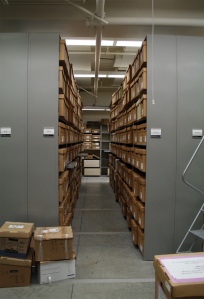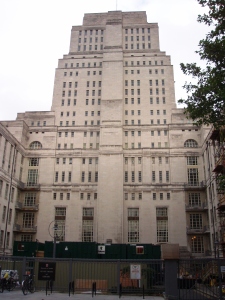In November 2013 I carried out a sample survey of 114 archives in the UK, looking specifically at their social media services (see Archive Blogs in the UK – A Sample Survey for the results). I was particularly interested in the status and existence of blogs, Twitter feeds, and Facebook pages, although I did also take note of other types of social media such as Flickr and YouTube. In November 2014 I did a follow up survey of the same 114 archives to see how things have progressed.
The first table below shows the amount of blogs, Twitter feeds, Facebook pages, Youtube channels, and Flickr channels the 114 archives had in November 2013 and 2014. It should be noted that these archives break down into four categories: National (18); Local (88); Church (2); and University (6).
Social Media used by archives
| Social Media Type | 2013 results | 2014 results |
| Blogs | 26 | 38 |
| 39 | 46 | |
| 43 | 48 | |
| YouTube | 12 | 14 |
| Flickr | 20 | 26 |
In most cases the use of social media by each individual archive remained much the same. The greatest variation in the results appears to have derived from the World War One Commemoration, as several local archives have started up a temporary blog which records soldier’s diaries or otherwise reveals information from their records concerning the war.
I did notice that the regularity of posts in some blogs has dropped slightly in general terms. Although it is hard to be certain of the reason for this, it would seem likely to be a natural settling in of the blog as it ceases to be a new thing that the archive does, and therefore it settles into a more manageable rhythm. In a few instances the blog has transferred from Blogger to WordPress, receiving a new look and feel in the process.
The second table (below) breaks down the results for blogs, Twitter, and Facebook by the archive category in an attempt to understand, in particular, variation between national and local archives. I have added some percentages to even out the results but obviously the large variation between categories in terms of their number make these numbers limited in terms of what they really tell us.
Social Media usage by type of Archive 2013
| Type | Total | Blog | ||
| Church | 2 | 1 (50%) | 1 (50%) | 1 (50%) |
| Local/regional | 87 | 13 (15%) | 31 (35%) | 26 (30%) |
| National | 19 | 8 (42%) | 10 (52%) | 9 (47%) |
| University | 6 | 5 (83%) | 3 (50%) | 4 (66%) |
Social Media usage by type of Archive 2014
| Type | Total | Blog | ||
| Church | 2 | 1 (50%) | 1 (50%) | 1 (50%) |
| Local/regional | 87 | 24 (27%) | 35 (40%) | 32 (36%) |
| National | 19 | 9 (47%) | 10 (52%) | 10 (52%) |
| University | 6 | 4 (66%) | 2 (33%) | 4 (66%) |
Blogs: In general these figures suggest that there have been very little change. The only significant number change can be seen in the number of blogs owned by local/regional archives, which (as previously mentioned) seem to relate to the World War One Commemoration.
These include the following:
- Bedfordshire and Luton Archives: Bedfordshire at War and Bedfordshire Home Front
- Berkshire Record Office: Berkshire at War
- Dorset History Centre: The Diary of Regimental Sergeant Major George Beck
- Nottinghamshire Archives: World War I Nottinghamshire Memorial Project
However, there are also some other variations in this pattern. Four of the blogs that do still exist do not seem to have been posted on within the last six months or contain a notice to explain that they are no longer active. This means that 8 out of the 38 blogs recorded in the survey for 2014 are either temporary or non-active as of November 2014.
Twitter: There are eight new Twitter feeds introduced by the archives in 2014. Excluding these, all pre-existing Twitter feeds appear to have increased their number of followers by an average of 33% over the course of the year. This figure of course incorporates a large variation in numbers. The British Library, the National Archives, and the Shakespeare Birthplace Trust Record Office have followers in the hundred thousands, whilst all other archives are in the hundreds or under 7,000.
Facebook: In the 2013 study 31 of the archives had a Facebook account. This year 4 new accounts were in operation but 1 account had ceased to exist (equalling a net increase of 3). In 2014, the total of Facebook accounts in use was 34. On average ‘likes’ of these pages increased by about 34% during the course of the year, although it should be again understood that there is a huge variation in numbers of followers between accounts (the British Library, the Shakespeare Birthplace Trust Record Office, and the National Archives had 1,000s of more followers than any of the other archives).
Methodology
Last year I was aware of the severe limitations in the methodology that I was using and problems within the results related to the numbers in each archive category. These issues remain for the 2014 study. Both surveys were carried out in November of their respective years. In each instance the archive website was examined for signs of social media usage and data collected from clicking on the website access routes. Although this captures most of the data accurately, I believe that there are some occasions when an example of social media usage is not well-advertised on the website (or ignored altogether). There is, therefore, some possible inconsistency in the data collected.
In addition, in many cases archives that are categorised as local (i.e. record offices) have an online presence only through the council website and therefore consist of little more than a collection of static pages. In these instances there are often Twitter and Facebook accounts, but they are general to the council and not specific to the archive itself. These have been ignored for the purposes of this study.
The greatest problem with the survey is its limitation of size. Only 114 archives are included, most of which are local/regional centres. There are well over 2,500 archives across the UK. This means that the study focus is too narrow and needs to be expanded for it to be of use.
In 2015 I will be looking at a different approach. Firstly, the sample is too small to gather adequate results, but secondly, the method for gathering that data is not precise enough and is too time consuming (considering the inadequacies of the results).












 Do Archives in the UK use social media and if they do in what way? This sample study carried out in November looks at the state of blogs, Twitter, and Facebook usage by approximately 100 archives in the UK.
Do Archives in the UK use social media and if they do in what way? This sample study carried out in November looks at the state of blogs, Twitter, and Facebook usage by approximately 100 archives in the UK.

 Like any other genre of social media publishing, blogging can be useful for academics, or it can be a waste of time. It can be a good mechanism to engage with scholarly or public debate, to ‘think aloud in public’, to establish a online presence for your work or to demonstrate that the public funding for your research career has been well-spent. Or it can eat up a lot of your time and effort to little effect. So I think the key thing probably is to ask yourself what you want to achieve by blogging in the first place, and at which stage in the research process you are going to concentrate your efforts.
Like any other genre of social media publishing, blogging can be useful for academics, or it can be a waste of time. It can be a good mechanism to engage with scholarly or public debate, to ‘think aloud in public’, to establish a online presence for your work or to demonstrate that the public funding for your research career has been well-spent. Or it can eat up a lot of your time and effort to little effect. So I think the key thing probably is to ask yourself what you want to achieve by blogging in the first place, and at which stage in the research process you are going to concentrate your efforts.